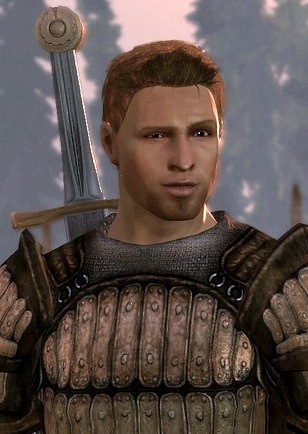Okay, out of my extensive readership (of possibly two dozen) this will interest, I think, four people at the very most: but I have been absolutely obsessed for the past three weeks with this computer game, Dragon Age, and I’m really kind of driven to sort out my thoughts about the game. Warning: this entry will be very spoilery for anybody who might want to play the game but hasn’t yet.
Roger Ebert recently sparked an Internet brou-ha-ha when he stated, categorically, and foolishly, that video games can never be art. (He later backed down from that stance, kind of.) That debate doesn’t interest me very much as to me it’s flatly obvious that art can potentially be made from any materials, and within any form or genre. And I wouldn’t argue that Dragon Age is Art with a capital A. But it is philosophy.
Not necessarily very sophisticated philosophy, mind you, but the game is remarkably coherent in advancing a particular worldview—one that I think, from my conversations with my BFF (a recovering philosopher), would correctly be described as utilitarian. As you play the game you are forced to make moral choices, and sometimes there is no purely “good” option. Instead you have to decide what kind of sacrifices you’re willing to accept in the name of the greater good. This is, from my perspective, what the game’s about. It has multiple interweaving storylines—potentially hundreds of them—but the main plot elements all reinforce the same theme: There is no victory without sacrifice. Some mages have been possessed by demons: do you slaughter them all—even the innocent—or do you choose to run the risk of allowing a demon-tainted mage to survive, potentially threating the entire kingdom? Orcs (well, “darkspawn,” but it’s the same idea) are marching on your fortress—will you weaken its defense by sending forces to protect the outlying settlements, or do you allow the villagers to burn in order to strengthen your position in the ultimate battle? You’re about to challenge the corrupt king in a meeting of nobles, and to win a diplomatic victory you need every vote. Will you allow the son of one of the important nobles—a rapist—to escape justice, in order to get that noble’s vote? There’s a ton of these decision points.
And sometimes it’s personal. The game gives you a small number of potential companions to help you in your battles and your political scheming, and each of these companions has their own opinions on the choices you face, as well as their own storylines and side quests. Let me introduce you now to Alistair:

Alistair is a nice guy. He likes it when you help people, and usually objects to taking the ends-justify-the-means path. He’s also really useful in battle, as he’s tough and armored and can act as a “tank,” drawing aggression away from your character and soaking up most of the damage in a fight. He’s also your first companion, tied to your character tightly in the storyline: both of you are Grey Wardens, members of an elite strike force who absorb some elements of the “darkspawn taint” into yourselves in order to be able to more effectively fight them. So you, the hero, are from the beginning tainted by darkness—it’s not subtle, is it? (When I tried to tell Sam about how my character had the taint, and Alistair had the taint too, and how this made us very close, he did nothing but laugh at me. After that it was a lot harder for me to listen with a straight face to all the game’s dialogue about taint. And there’s a lot of it, too.) Most of the Grey Wardens get wiped out early in the game, so you and Alistair are set up as the only survivors of this band of brothers. Although he’s your senior in the order, he defers to your leadership from the beginning. This might seem to be a game-mechanic contrivance—you’re the player, after all, so it’s always your decisions that matter—but other characters remark on it during the game, and as you travel with Alistair he slowly reveals more of himself.
He’s actually the bastard son of the former king, and this has caused him nothing but grief in his life. He was shipped to a distant relative of the king’s where he was raised mostly in the stable; what attention he received was mainly aimed at drilling into him that he would never have a claim to the throne. Those who didn’t hate and fear him because of his parentage were jealous of him, so affection was scarce in poor Alistair’s childhood. When he was old enough he was pushed into the clergy, which he hated, although he did take to his martial training as a knight-templar. So he shuns any sort of leadership role mostly because royal politics have been so bitter for him.
Alistair’s armored not only with heavy plate, but also with quips and self-deprecating humor. His little comments during your travels, and banter with other party members, can be inordinately funny. Under that, though, he’s starved for love, and will cling to any sort of affection shown to him. If you’re playing a woman, and you’re nice to him, he’ll start flirting with you in a tentative sort of way; you can figure out pretty quickly that, having been raised by the clergy, he’s not had a lot of experience with the fairer sex. But between his goofy jokes and bashful come-ons you’ll also see flashes of fire from Alistair: he believes strongly in justice, duty, and the honor of the Grey Wardens (who he’d latched on to as a surrogate family, before they were all slaughtered: oh, Alistair).
Anyway, you can push the Alistair relationship in a lot of different directions. Depending on your choices he can be your faithful comrade-in-arms, your lover, your King; or he can end up exiled or beheaded. Because the game is relentless in pushing its “in victory, sacrifice” motto, in many ways the outcomes that are best for Alistair are worst for the kingdom, and vice versa. In probably the cruelest ending for Alistair’s story, it’s possible to force him into taking the throne through a loveless political marriage to the daughter of his worst enemy, and then to shatter his ideals by inducting that enemy into the Grey Wardens, allowing him redemption through a hero’s death. In Alistair’s eyes this makes a mockery of justice, desecrates the meaning that the Grey Wardens had held for him, and traps him in a marriage with a conniving and manipulative Queen who will always remind him of the hatred he holds for her father. He’ll never forgive you if you do this to him: but it also results in a Golden Age for the kingdom. In the game’s logic, you see, Alistair’s mercy and compassion are well-balanced by the Queen’s ruthlessness and capacity for manipulation, as well as her political connections, and so the sacrifice of his happiness and your friendship wins the best possible outcome for your people.
I didn’t know all this when I played. I knew that I loved Alistair’s combination of wounded-puppy endearingness and knight-templar courage and convictions, and returning his affection resulted in the development of a surprisingly affecting romance, one bright and beautiful thing in all the darkness. (Again, the game’s not subtle: at one point Alistair gives you a rose and a little speech about how he picked it as his reminder that beauty exists even amid the horrors of a demonic invasion. He gives it to you because you’re his rose. Oh, Alistair.) I did my best to protect him, emotionally, as the game proceeded: this was probably a mistake, but it wasn’t until after I’d finished my first playthrough that I understood quite how relentless the game was going to be in its commitment to a shades-of-gray philosophy. I was starting to cop to the realization that in this world nice guys finish dead, but Alistair had me, to do what was necessary and to soothe him about it afterwards.
It’s actually possible to “harden” Alistair by teaching him that everybody’s out for themselves, but in order to do this you have to be cruel to him at a vulnerable moment. Because it’s Dragon Age, you probably should do this if you intend to make him King: a price must be paid, always. You actually have the opportunity to determine a royal succession twice in the game—once for the human throne and once for the dwarves. Your choice in the dwarven kingdom is between a lying, kinslaying dwarf and a noble and honorable one. It turns out in the end that the backstabbing one is capable of securing a much better outcome for his people. Similarly, a hardened Alistair makes a better King. (He also jettisons his scruples regarding sexual fidelity, which can allow you to remain his mistress even after he becomes King, if you’re willing to accept that as a “happy ending.”) In my playthrough, though, I loved my geeky, noble Alistair and so I protected his idealism and his naivete.
I had come to conceive of my heroine as empathetic and compassionate, but with a steely streak of cold pragmatism: she was not above telling people what they wanted to hear in order to get her way. I had my “Coercion” skill maxed out and could pretty much manipulate anybody into anything. I tried to use my powers mostly for good, but when it came down to it I would sacrifice innocent lives for the greater good. I decided somewhere through the playthrough that Alistair was the only person I’d never lie to, and so we had at least one memorable spat over a decision I made, but he accepted in the end that I’d done what I thought was right.
At this point you may be starting to see how sophisticated the game is in modeling a complicated relationship, and also how much emotion I was investing in the game. I was practically two-timing Sam with this collection of pixels and scripts. (Sam, somewhat infuratingly, didn’t seem to think he had any competition, and continued to get a lot of juvenile amusement whenever I babbled about taint.)
I navigated the Landsmeet well enough—didn’t get a pure diplomatic victory, had to spill some blood, but I secured the throne for Alistair and then declared that I would be ruling beside him as Queen. Alistair took this news well enough; he still didn’t want to be King, but was willing to accept it as a matter of duty, and was rather more startled anyway by our sudden engagement. (“Is this the point where everybody starts laughing at me because I have no pants on?” he muttered while the crowd was applauding us.) Later, in private, he had more to say: “I like the idea,” he told me, “but they’ll want an heir, you know…” And then he broke some bad news to me about the darkspawn taint. Not only was it going to kill us both in the end, but it has a very negative impact on fertility. I guess this means it’s okay that we were sharing a tent at night and never found any medieval condoms in the loot drops.
Well, of course, my mind immediately started churning for answers. (Maybe the Grand Oak in the elven forest could bestow some kind of fertility magic…maybe the mages could whip up some kind of silverite-based potion to temporarily suppress the taint…) but none of that was in the dialogue options, so I chose “It’s not necessary” (“Well, it won’t be for lack of trying!” seemed rather too flip a response to a serious matter of political stability) and Alistair sighed heavily and agreed with me that we could push that problem down the road for a bit, and maybe we should just concentrate on killing the Archdemon and winning the war against the darkspawn.
At this point I started to get a little bit irritated with Alistair. “I like the idea” is pretty far from a romantic proposal of marriage, after all, and I didn’t like that I’d been forced to declare myself Queen in front of the whole Landsmeet rather than having him go down on bended knee. I’d discovered, though, that Alistair would actually break up with me if I made him King without doing that: because of the fertility issue, if left to his own devices he was going to go find someone untainted to be his Queen. It was all due to that pigheaded sense of nobility and duty, the one I’d played on to get him to take the throne in the first place; he would insist on sacrificing his own happiness for the good of the kingdom. I didn’t want that, so I was willing to railroad him into marriage, but I resented it a bit.
Plus, his dialogue had changed. When we were first flirting, and he was working up the courage to ask me to share his tent, if I clicked on him I’d get a smouldering “Your desire is my command” in response. Now it had changed to a brusque “Something you need, my dear?” We still slept together at night, and I had the option to kiss him if I wanted, but he was no longer taking any initiative in our relationship. And I knew this was because he wouldn’t; Alistair didn’t have any more romantic scripts to offer because, left to his own initiative, he wouldn’t be in a romance with me. I’d used my Coercion against him after all. And the damn game wasn’t even going to be satisfied with that; the designers would be thrilled to know that they’d gotten me to violate my own private little scruple there, but the game didn’t know about it, so it wasn’t going to count as the sacrifice that would be demanded.
It was the night before the final battle when everything went to hell. First I learned the last secret of the Grey Wardens: because we had mastered the darkspawn taint (I can hear Sam chortling even now) we were the only ones who could truly slay the Archdemon. Normally its soul would simply pass into the nearest tainted vessel, meaning that as soon as one Archdemon was struck down, another would rise. But if a Grey Warden delivered the killing blow, the Archdemon’s soul would pass into us, and we would not be possessed. We’d be killed.
At this point in the game there are three Grey Wardens: Alistair, the player, and a new Warden who shows up suddenly from another kingdom to offer some exposition. New Warden offered to take the killing blow himself, but I don’t think either Alistair or I truly believed he was going to be capable of it. I said I’d do it if he fell, and Alistair didn’t argue. Then we went to bed, and not even together: we’d been given separate rooms at the estate we were staying in, and when I dropped by Alistair’s he didn’t even invite me to stay. So, fuming, I headed to bed…
…where I was confronted by one of my other companions, Morrigan the Swamp Witch. I liked Morrigan well enough—didn’t trust her farther than I could throw a cave bear, which incidentally is one of the things she can turn into—but found her powers useful and her brittle, antisocial dialogue amusing. I had however found it prudent to separate Morrigan and Alistair early on, as they were prone to falling into the kind of snappy repartee that generally (in stories at least) betrays a simmering attraction. And in fact Morrigan was there to confirm all my suspicions. It seems that, all along, her goal had been to conduct some kind of “dark ritual” with a Grey Warden, a sex rite that would get her a baby with the power of an Archdemon. If I let her have her way with Alistair, the embryo would absorb the Archdemon’s soul and Alistair and I would both live. In return, Morrigan would disappear with the child and never be seen again. She refused to say anything more about what she wanted with the baby.
I wasn’t about to be party to this. Firstly, I think imbuing a baby with the soul of an Archdemon probably counts as child abuse. Secondly, Morrigan would be the worst mother ever. Thirdly, it would break Alistair in terrible ways to know he’d created his own bastard child only to sacrifice it to a witch. Fourthly, the game had been just exquisitely cruel in letting me know that since I could never bear Alistair’s child, in all likelihood it would be the swamp witch who would have his only heir.
But if I were willing to agree to this, I could be Queen, and rule the land with Alistair as my King.
I went to Alistair just to see what he’d say. I expected he’d be horrified and that it would take massive amounts of deceit or Coercion to get him to accept this bargain. Instead he dithered about for a bit and offered up a weak: “Are you sure? I mean…is this really what you want me to do?”
“NO, you spineless idiot,” I yelled at the screen, “it is absolutely NOT what I want you to do.” I was really put out to discover that almost all of the dialogue choices lead, after some token resistance, to Alistair’s accepting the bargain. In fact I’m not sure if it’s possible to make him refuse! I knew he secretly liked her. Well, he lost a massive amount of approval points with me right there, let me tell you. Minus twenty at least. I stormed back to Morrigan and told her to shove her dark ritual where the sun don’t shine.
So I went into the final battle, knowing that I would have to sacrifice myself, and basically seething against Alistair. “I know it’s dumb,” I told Sam, “but I’m mad at him for not taking a stronger stand. I know he’s just a computer game character and it makes sense that he’ll do what the player says. But I liked him for his convictions and his passions and it’s like he doesn’t have any of that now.”
I don’t remember what Sam said but it was something along the lines of “At least you’ve still got his taint.”
Anyway, as I marshalled our forces during our final battle I kept clicking on Alistair to see if he finally had anything more meaningful to say, but it was always just “Something you need, my dear?” Finally I took down the Archdemon, and ran up to it as it fell to claim my Heroic Destiny…
…and, hey, cutscene. Alistair jumped in and wants to talk. Let me take the final blow, he says. I’m the king and it’s my duty.
Shut up, I say. That doesn’t even make sense. It’s because you’re the king that you have a duty to survive. But none of the dialogue options match this precisely, so I choose “That’s not the real reason and you know it,” annoyed again that I have to prod him into declaring his feelings for me.
Which he dutifully does. “I know how I feel about you,” he says. “I can’t let you die, not when there’s something I can do to save you.”
Here’s the dialogue option I wanted at this point: “You can’t even use the word love, Alistair? To your FIANCEE? After everything? I’m about to die, you gigantic douche. WHATEVS. Get out of my face.”
Here’s the dialogue options I actually got: One that basically said “yeah, okay, go ahead,” and one that read “No. I can’t let you die either.” I chose the No option, knowing full well that Alistair was only a collection of pixels and could only do what I, the player character, decided. No, Alistair, I told him as I clicked it. Go off and be king.
Here’s how Alistair responded:
“You say that like I’m giving you a choice.”
And then—as I gaped at the screen in slack-jawed disbelief—my computer boyfriend grabbed his sword, vaulted heroically atop the fallen form of the Archdemon, drove his blade deep in the creature’s skull, was bathed in an explosion of power, and died.
And that was the end! THAT WAS THE END. The former queen—the daughter of Alistair’s worst enemy—got to keep the throne and rule alone. She actually did a good job of it according to the epilogue. For my role in defeating the archdemon I got to ask her for a single boon; I chose the one I thought would mean the most to Alistair, which involved rebuilding the Grey Wardens. All my other party members congratulated me for a job well done and seemed to expect me to be happy for some reason. I wanted to kill them all. They all asked me what I would be doing next. None of the options included “Throwing myself on my lover’s grave and sobbing my eyes out.” My character walked off into the sunset and the credits rolled.
I went to Sam to tell him what had happened. “Alistair…killed himself! For me! I had just been complaining about how he didn’t show any initiative and then I told him I was going to take the killing blow and he said, he said, You say that like I’m giving you a choice…”
“Are you crying?” Sam asked scornfully.
At that point I went online to read about all the different possible endings. I was sure I’d gotten the very worst one, and I fully intended to reload and do whatever it took to get a happy ending. It turns out that there are lots of different paths and they branch in complicated ways. Considering Alistair’s story alone, you can “harden” him or not, romance him or not, let him remain a Grey Warden or push to make him King—in which case you can end up as Queen under a certain set of circumstances, or his mistress under another set, or he may call off the romance as I’d already discovered—you can accept Morrigan’s ritual or refuse it, and you can bring Alistair to the final battle or force him to remain behind. There are many, many possibilities, but none of them lead to a happy ending, at least not for the Warden that romances Alistair. The game is in fact absolutely diabolical on this point.
Through a process of elimination I eventually came to understand that the ending I got wasn’t the very worst. It was the only possible ending for us. Because I am not willing to accept Morrigan’s dark ritual, a Grey Warden has to die. So long as he is at my side in the final battle—and he loves me—Alistair won’t allow me to sacrifice myself. I can save both Alistair and myself by allowing the corrupt general Loghain to become a Grey Warden and to take the killing blow, but as I explained before, Alistair views this as the ultimate betrayal, much worse than death. Or I can save Alistair by refusing to allow him to accompany me in the final battle, but he objects to this too, invoking the fact that being a Grey Warden is the only thing he’s been proud of in his life and that it’s a Grey Warden’s place to fight the Archdemon. Refusing him on this is a betrayal more subtle than giving Morrigan what she wants, or making Loghain a Grey Warden, but after hearing his dialogue on the matter I accept that it is a profound betrayal nonetheless. Stripping him of a Grey Warden’s place at the crucial moment takes away something from him that has been the core of his life’s meaning.
If he weren’t in love with me, he could stand with me against the Archdemon and still allow me to sacrifice myself; but it wouldn’t be enough to simply go back to the Landsmeet and allow him to break up with me. In this devious, diabolical game he’d still love me, and so he’d still insist on sacrificing himself at the end (with the added twist that he’d declare himself a fool for ending the romance and beg my forgiveness before he died). I would have to do something terrible to genuinely lose his love. And I’m not willing to do that.
So there are a million different possible endings, but no combination of choices will let you get through without accepting some kind of pain. And because I’m me, and he’s Alistair, and this game is mean, the only ending I could ever get is the one where my computer boyfriend, a collection of pixels and scripts, shocked me at the crucial moment by being the man I’d made him.
Oh, Alistair.


















